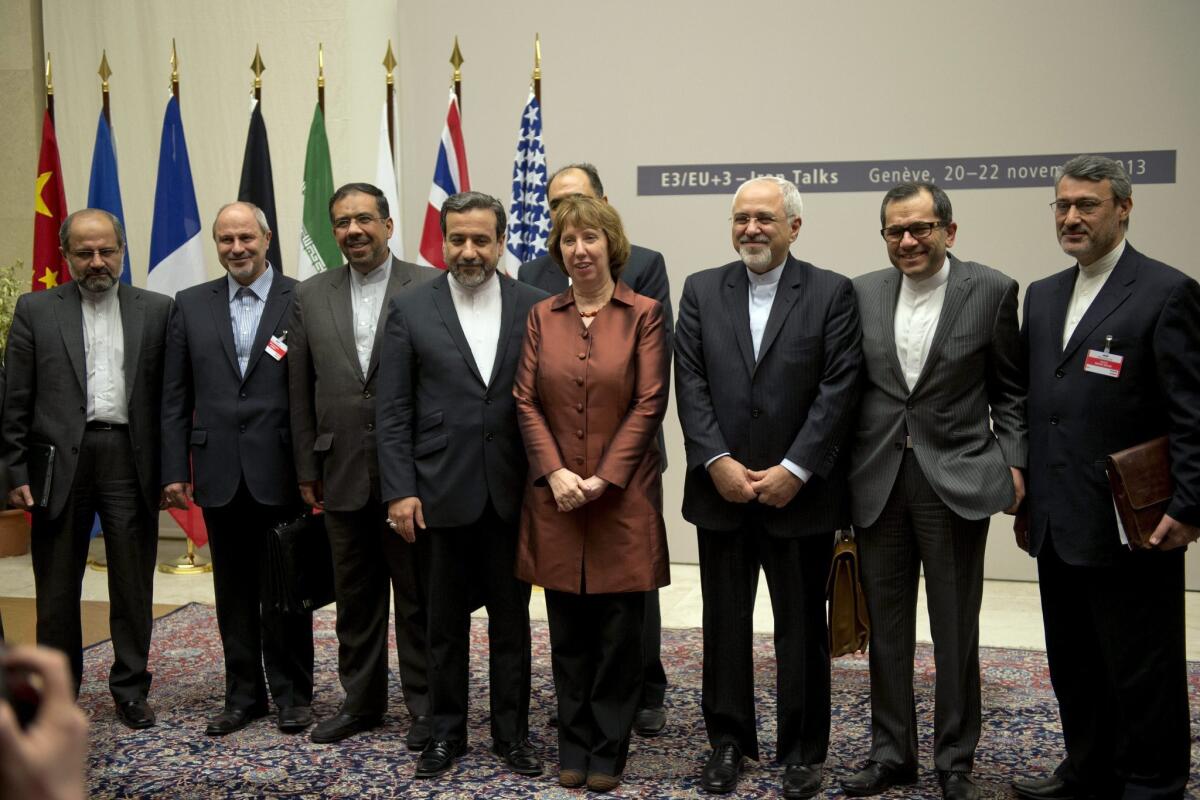Iran deal deserves a chance

- Share via
By definition, the interim agreement under which Iran agreed to suspend progress on its nuclear program in exchange for limited relief from economic sanctions isn’t a permanent solution. But the deal worked out in Geneva over the weekend nevertheless represents progress in the long and frustrating effort to ensure that the Islamic Republic doesn’t develop a nuclear weapon.
The “Joint Plan of Action” agreed to by Iran and the so-called P5-plus-1 — the five permanent members of the U.N. Security Council and Germany — is at best a down payment on a final deal. To obtain what the White House calls “limited, temporary, targeted and reversible relief” from some sanctions, Iran has agreed for the next six months to halt all uranium enrichment above 5%, dismantle the technical connections required for such enrichment and limit its production of centrifuges used in that process. (Enrichment involves an increase in the percentage of an isotope that at very high levels can make a nuclear weapon possible.)
It also will refrain from commissioning a heavy-water reactor in the town of Arak that theoretically could produce plutonium that could be used to develop a nuclear weapon. The agreement allows for aggressive (in some cases daily) monitoring of Iranian facilities by the International Atomic Energy Agency.
Critics make essentially three arguments. One is that the agreement is a retreat from the Security Council’s previous insistence that Iran stop all enrichment. Yet it was expected that that demand would be softened if Iran were to take credible steps toward ensuring that it would use nuclear power for peaceful purposes only, and the nations that lobbied hard for the U.N. resolutions are the same ones that have entered into this interim agreement. Second is the suggestion that the P5-plus-1 should have held out for a final deal. A lasting solution is, of course, ultimately the goal, but limited and temporary relief from sanctions may make it easier for the new government of President Hassan Rouhani to persuade Iran’s hard-liners and religious leaders to support negotiations toward a permanent deal.
Finally, there is the complaint that Iran will drag out the negotiating process so that the P5-plus-1 will be pressured to extend the temporary agreement not just once or twice but indefinitely. Meanwhile, the argument goes, support for sanctions would crumble. It’s true that a temporary, confidence-building agreement shouldn’t be allowed to evolve into a permanent status quo. But this deal is a prudent way to test Iran’s intentions.
The agreement is also a test for Congress. (Some have already flunked, such as Republican Sen. John Cornyn of Texas, whose response to the deal was this inane tweet: “Amazing what WH will do to distract attention from O-care.”) Not every senator or representative will agree with Sen. Dianne Feinstein (D-Calif) that the deal is a “giant step forward.” But even skeptics should hold their fire and give it time to succeed — or fail.
More to Read
A cure for the common opinion
Get thought-provoking perspectives with our weekly newsletter.
You may occasionally receive promotional content from the Los Angeles Times.






